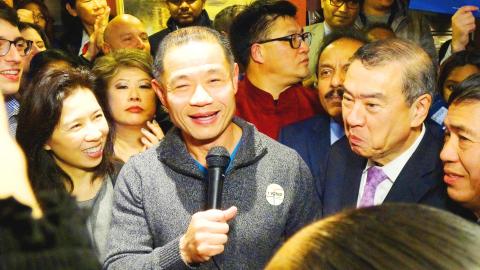Three US Democratic Party candidates of Taiwanese descent in won their races in New York state, including former New York City comptroller John Liu (劉醇逸), who will become the first Taiwan-born New York state senator.
Liu ran in one of the most tense races in the state, a four-way competition that included New York state Senator Tony Avella, whom he defeated in the party primary in September, Republican Party challenger Vickie Paladino and Conservative Party nominee Simon Minching.
Liu won 54 percent of the vote, while Paladino won 30 percent, Avella’s 20 percent and Mincheng’s 1.4 percent, unofficial results show.

Photo: CNA
Liu , whose family moved to the US when he was five, said that he was proud to be a Taiwanese-American and was proud to be voted into office.
US Representative Grace Meng (孟昭文), who represents New York’s sixth congressional district, faced a challenge from Green Party candidate Tom Hillgardner, but secured a fourth consecutive term to the US House of Representatives with 91 percent of the votes.
New York State Assembly member Niou Yuh-line (牛毓琳), who was born in Taipei, represents the state’s 65th district, won re-election to her seat.
In November 2016, Niou became the first Asian-American to be voted to the State Assembly for the 65th district, which includes the heavily Democratic Lower Manhattan, Chinatown, the Financial District, Battery Park City and Lower East Side.

PREPAREDNESS: Given the difficulty of importing ammunition during wartime, the Ministry of National Defense said it would prioritize ‘coproduction’ partnerships A newly formed unit of the Marine Corps tasked with land-based security operations has recently replaced its aging, domestically produced rifles with more advanced, US-made M4A1 rifles, a source said yesterday. The unnamed source familiar with the matter said the First Security Battalion of the Marine Corps’ Air Defense and Base Guard Group has replaced its older T65K2 rifles, which have been in service since the late 1980s, with the newly received M4A1s. The source did not say exactly when the upgrade took place or how many M4A1s were issued to the battalion. The confirmation came after Chinese-language media reported

The Taiwanese passport ranked 33rd in a global listing of passports by convenience this month, rising three places from last month’s ranking, but matching its position in January last year. The Henley Passport Index, an international ranking of passports by the number of designations its holder can travel to without a visa, showed that the Taiwan passport enables holders to travel to 139 countries and territories without a visa. Singapore’s passport was ranked the most powerful with visa-free access to 192 destinations out of 227, according to the index published on Tuesday by UK-based migration investment consultancy firm Henley and Partners. Japan’s and

A Ministry of Foreign Affairs official yesterday said that a delegation that visited China for an APEC meeting did not receive any kind of treatment that downgraded Taiwan’s sovereignty. Department of International Organizations Director-General Jonathan Sun (孫儉元) said that he and a group of ministry officials visited Shenzhen, China, to attend the APEC Informal Senior Officials’ Meeting last month. The trip went “smoothly and safely” for all Taiwanese delegates, as the Chinese side arranged the trip in accordance with long-standing practices, Sun said at the ministry’s weekly briefing. The Taiwanese group did not encounter any political suppression, he said. Sun made the remarks when

BROAD AGREEMENT: The two are nearing a trade deal to reduce Taiwan’s tariff to 15% and a commitment for TSMC to build five more fabs, a ‘New York Times’ report said Taiwan and the US have reached a broad consensus on a trade deal, the Executive Yuan’s Office of Trade Negotiations said yesterday, after a report said that Washington is set to reduce Taiwan’s tariff rate to 15 percent. The New York Times on Monday reported that the two nations are nearing a trade deal to reduce Taiwan’s tariff rate to 15 percent and commit Taiwan Semiconductor Manufacturing Co (TSMC, 台積電) to building at least five more facilities in the US. “The agreement, which has been under negotiation for months, is being legally scrubbed and could be announced this month,” the paper said,